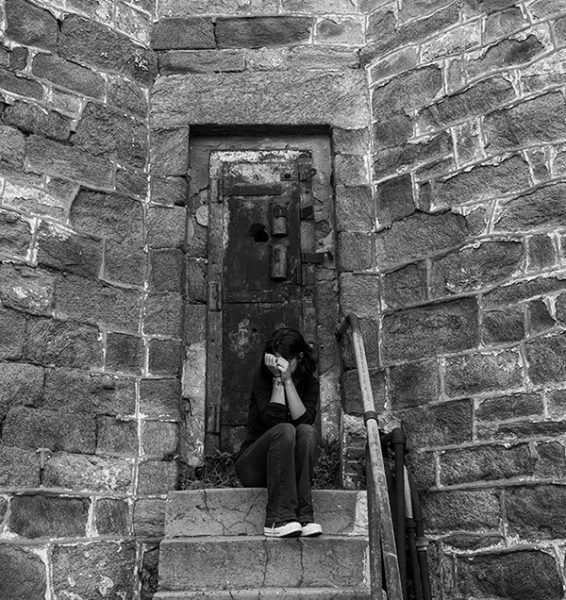Renegade Review: Black Mirror Bandersnatch
January 23, 2019
Black Mirror: Bandersnatch is an innovative Netflix movie adaptation of the hit series of the same name: Black Mirror. The title arrived on Netflix on December 28, 2018, and has been gaining exposure ever since.
Black Mirror: Bandersnatch dives deep into the themes of mental health/illness, the idea of free will, and how technology affects it. Throughout the movie, audience members follow Stefan Butler, (played by Fionn Whitehead) through his journey to complete his game adaptation of the fictional choose-your-own-adventure novel, Bandersnatch, in time for Christmas of 1984.
Viewers are given two choices during various points in the story, with a ten second time limit to pick. If the viewer does not pick in time, a random choice will be selected, which in itself is an interesting experiment to try at home. Depending on the certain choices chosen, the viewer will get a different ending each time they watch/play. The following review does not contain spoilers, however, be aware that farther down the review contains spoilers.
SPOILER-FREE REVIEW
Overall, Black Mirror: Bandersnatch‘s main and side plots have a thrilling and mind-boggling feel to them; each corner of the movie is brought up again, making it an (although large) cohesive piece. Although the beginning starts slow, the movie picks up the pace with thrilling choices like whether or not to jump off Colin Rittman’s (played by Will Poulter) balcony, or less thrilling, yet important choices like whether to argue with Stefan’s father, Peter (played by Craig Parkinson) or not.
The meta-like aspect of the movie makes viewers think about not only themselves but also society’s viewpoint on mental illness and free will. On the other hand, this meta aspect causes viewers to lose interest after the first few plays, myself included. I only played for about two hours and got three of the five endings at first, as I had lost interest in replaying the first half of the cutscenes in order to get to the last few decisions I had not gotten to yet (I did come back to finish the last two endings eventually.)
All five of the endings had different kinds of easter eggs to 1980’s culture and to the original show itself, Black Mirror. In addition, Netflix itself revealed on Twitter that there was an extra path if the viewer picked up the family photo of the Butlers twice.
On the technical side of things, the cinematography of the movie was well done, using colors and symbols to create the tone of the scene. In addition, the script was also very well done. Several characters’ lines had important foreshadowing that even after a second viewing, the viewer may miss.
All in all, the positives overpower the negatives. The little flaws the movie did have can be ignored when compared to the incredible script, cinematography, acting, and viewer experience.
BEWARE: SPOILERS UP AHEAD
The following is an in-depth version of the spoiler-free review, including all points of the argument above and more, but including spoilers. Now that the warning is out of the way, overall, I would give Bandersnatch 4.5 stars out of 5. I will be addressing my opinions on the characters, plot, script, and my personal favorite moments and endings from the movie, but if you have differing opinions, do not take them to heart.
Bandersnatch’s characters’ have lots of depth to them, bringing forth lots of emotional storytelling that made the endings fit together cohesively. The arcs of each character we’re exhilarating, it was always so hard to guess what each character would do next.
Seeing Stefan slowly go insane was an interesting arc that slowly got more intense as the viewer played on, leading up to the option of killing Stefan’s father. Not to mention, Poulter’s character, Colin Rittman, has so much depth. From the get-go, I knew Colin was going to be one of my favorite characters, especially due to his meta-madness lines towards both Stefan and the audience that puzzles the viewers through every line. Of course, all other characters in the movie were very well acted, and the dialogue that was given to them for the story’s narrative was great, but Colin and Stefan’s lines were just the highlights for the movie’s scripted characters. The film’s script was written by Alice Lowe, (who also plays Dr. Haynes) Charlie Brooker, and David Slade, who put together the heart-stopping script that keeps us viewers watching.
The foreshadowing throughout the plot was my favorite element of the movie overall. It was completely mind-boggling to see Colin tell Stefan that the choice you made, (if you accepted the offer to work on a team for Tuckersoft) was the wrong one. My first play-through, I chose to accept the offer, thinking I was on the right track already, intending to aim for an ending that got Stefan’s game to the top of the charts. Of course, when the scene cuts to the release of Bandersnatch and it’s a total failure, I was shocked and intrigued by Colin’s message. But that was just the tip of the iceberg. The countless times Dr. Haynes, told Stefan to “call her if [Stefan] need[ed] anything…” seemed like any normal sentence but turned out to lead to an entire ending, complete with the foreshadowing of her number through repeated words that correspond with a four-digit pin was insane when I first got that ending. Only on Netflix’s Bandersnatch viewers can find this amount of dedication and hard work that was clearly put into this piece of art.
Although the music and cinematography can’t be chalked up to be too much in Bandersnatch, they are still very well done nonetheless. The use of certain songs and dulled-down colors in the scenes give lots of essences and helps the certain scenes thrive, such as the LSD-induced jump off the balcony for example. The use of the slow song like “Love On A Train” by Tangerine Dream and the use of the subtle rainbow lighting give the scene an off-putting feel, making it one to remember. In addition, Colin’s rant about the lack of free will combine with these elements is thought-provoking and leaves the viewers stunned. When I got to this scene, I had to pause my screen in order to take in what Colin had said. This is not the only scene that does have this effect, but I believe this scene does it best.
Out of all endings, the majority votes’ favorite ending (including myself) was the ending that was the ending in which Colin Rittman’s daughter Pearl, (played by Laura Evelyn) reboots the game into a rumored Netflix adaptation after Stefan had murdered his father during the game-making process years before. When getting to this ending, you see a cutscene of Pearl mappings out the choices we see Stefan go through, making this ending the most captivating out of all of them.
The other endings were fascinating, but seeing Colin’s daughter grown up and foreshadowing the insanity Bandersnatch (the novel) brought to the original writer and Stefan, would eventually be brought upon her was astounding. Honestly, if Bandersnatch was not meta enough before, it is after this ending.
The actors and actresses did an impeccable job representing the true emotions and inner conflicts of each character well, making the entire movie seem real. The frantic actions of Stefan through the game-making process was hard to watch, yet I couldn’t keep my eyes off the screen.
This similar effect can be seen throughout all of the fanbases, making Black Mirror: Bandersnatch one of the most innovative and fresh pieces of watchable content on Netflix to date. Netflix has made smaller, and less thrilling versions of a choose-your-own-adventure for the children’s version of the website/app. However, none of those short choose-your-own-adventure movies have been as big of a hit for Netflix as Black Mirror: Bandersnatch.







